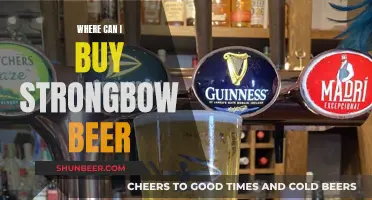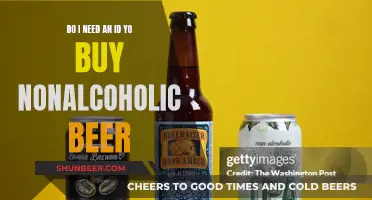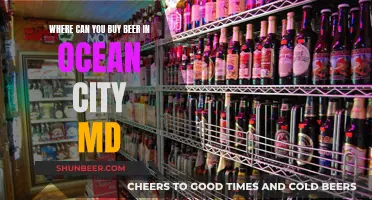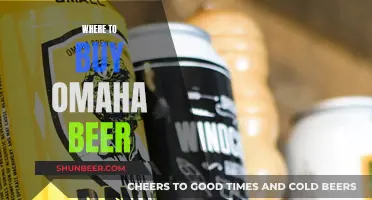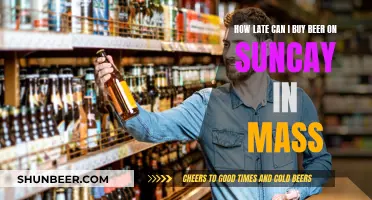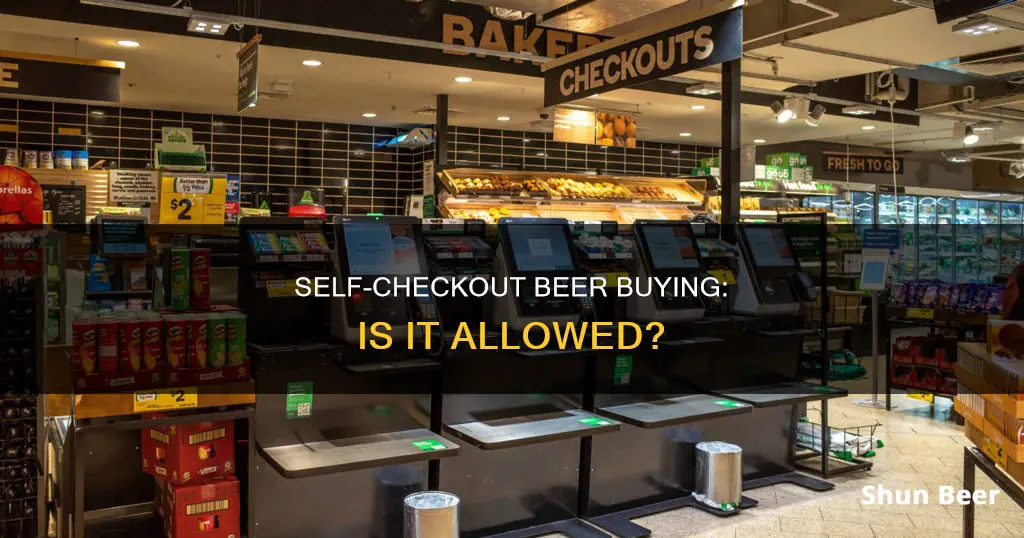
Buying alcohol at self-checkout has been a topic of discussion in recent years, with some countries and states implementing laws and regulations to restrict it. In California, for instance, a state appeals court ruled that grocery stores could no longer sell alcoholic beverages at self-checkout stands. This ruling was a significant loss for stores like Fresh & Easy, which relied solely on self-checkout lanes and had to make changes to their business model. The court's decision was based on the intention to prevent sales to minors and intoxicated individuals, as well as to reduce shoplifting. This topic has also been a subject of study, with research in the Netherlands finding that self-checkout lanes provided extreme alcohol availability to underage customers, with vendors failing to comply with age verification policies.
| Characteristics | Values |
|---|---|
| Can you buy beer at self-checkout? | It depends on the country and the store. |
| Age verification | An employee may be required to verify the customer's ID. |
| Self-checkout technology | The self-checkout machine may lock up and require an employee to unlock it. |
| Country-specific regulations | In California, the sale of alcoholic beverages at self-checkout stands is prohibited. |
| Store policies | Some stores may have specific policies or technological solutions to allow beer sales at self-checkout. |
What You'll Learn
- Self-checkout machines may lock up when beer is scanned, requiring an employee to check ID
- In California, a state appeals court ruled that alcohol cannot be sold at self-checkout stands
- A study found that self-checkout lanes in supermarkets are a source of alcohol for underage customers
- A self-checkout machine may flag an alcohol purchase, but an employee may not intervene
- In some cases, an employee may override an ID check at a self-checkout machine

Self-checkout machines may lock up when beer is scanned, requiring an employee to check ID
In California, a state law was passed in 2011 that banned the sale of alcoholic beverages at self-checkout stands. This was a major loss for stores like Fresh & Easy, which relies solely on self-checkout stands. The ruling was challenged by the California Grocers Association, which argued that a technological solution allowed them to sell alcohol at self-checkout stands without violating the law. The self-check stand locks up when beer is scanned, requiring an employee to verify the customer's ID and age. Despite this, the state Court of Appeal upheld the ban, stating that it was the Legislature's clear intent to prevent the sale of alcohol at any self-checkout stand.
The self-checkout machines locking up when beer is scanned is an important feature to prevent underage access to alcohol. Studies have shown that self-checkout lanes in supermarkets produce extreme alcohol availability for minors, with a success rate of 11.2% in the Netherlands. In this study, eight 17-year-olds were able to purchase a total of 225.78 US gallons of alcohol-containing beverages over two weekends. The number of liters purchased increased with each subsequent visit, indicating that the underage shoppers were learning how to buy more alcohol.
The self-checkout machines locking up is an effective way to ensure that an employee checks the ID of the customer. This adds an extra layer of security to prevent underage customers from purchasing alcohol. However, it is important to note that the success of this feature relies on proper staffing. In the study, it was found that out of 134 alcohol-purchase attempts, a vendor only showed up to validate the ID and age of the customer 49 times (38%). This low number of available staff is a clear problem that increases alcohol availability to minors.
To further enhance the effectiveness of self-checkout machines in preventing underage alcohol sales, additional age- and ID-verification support systems can be implemented. For example, self-checkout lanes can be equipped with ID readers or remote age verification systems. ID readers have the benefit of requiring all customers over the age of 14 to carry a valid ID. On the other hand, remote age verification systems have proven to be highly effective, with a 96% compliance level in tobacco vending machines.
Alabama's Midnight Beer Buying: What's the Deal?
You may want to see also

In California, a state appeals court ruled that alcohol cannot be sold at self-checkout stands
The case was brought forward by the California Grocers Association (CGA), who challenged the CA ABC Trade Advisory's interpretation of Section 23394.7. The CGA argued that if the checkout stand was locked upon the scan of an alcoholic beverage and required an employee to check ID, it was no longer a customer-controlled checkout stand and therefore complied with the statute. However, the DCA disagreed, finding that alcohol sales may not be completed at any customer-operated stand to ensure that age verification steps are taken to keep alcohol out of the hands of minors.
The ruling has significant implications for grocery and liquor stores in California, as they will now be required to send customers with alcohol to traditional checkout stands operated by cashiers. This change may impact the efficiency of the checkout process and increase the workload for store employees. Additionally, stores that rely solely on self-checkout stands, such as Fresh & Easy, will need to add manned checkouts or stop selling alcoholic beverages.
The California Grocers Association expressed disappointment in the ruling and considered appealing the decision. However, it is important to note that the court's interpretation of Section 23394.7 provides clarity and emphasizes the state's commitment to preventing underage access to alcohol. This ruling is consistent with similar restrictions on the sale of cigarettes, spray paint, and certain over-the-counter drugs through self-checkout lanes.
Buying Beer After Midnight in Philadelphia: What's the Deal?
You may want to see also

A study found that self-checkout lanes in supermarkets are a source of alcohol for underage customers
A study by Joris J. Van Hoof, published in the Journal of Substance Use, found that self-checkout lanes in supermarkets are a source of alcohol for underage customers. The study involved eight 17-year-old minors who acted as mystery shoppers and attempted to purchase alcohol at self-checkout lanes in supermarkets. The results showed that out of 134 attempts, alcohol was purchased 119 times, with a total volume of 854.67 litres (225.78 US gallons) of alcohol-containing beverages bought. This indicates a high level of non-compliance with age-verification policies at self-checkout lanes.
The study highlights the potential risks associated with self-checkout technology and the failure of vendors to adequately validate the age and ID of customers. In many cases, employees did not approach the terminal to verify the customer's age, allowing the purchase to continue without intervention. In other instances, vendors did not ask for ID or accepted expired or fake IDs.
The findings of this study have important implications for preventing underage access to alcohol. It suggests that self-checkout lanes may require additional age-verification measures, such as ID readers or remote age-verification systems, to ensure compliance with legal age limits.
Furthermore, the study also revealed that minors shared strategies for purchasing alcohol and were able to learn and adapt their approaches with each subsequent visit. This underscores the need for consistent and rigorous age-verification procedures to prevent underage customers from exploiting weaknesses in the system.
While the study was conducted in the Netherlands, the findings have broader applicability and highlight the global challenges associated with preventing underage access to alcohol through self-checkout lanes in supermarkets.
Beer at Stewart International Airport: Buy or Bye?
You may want to see also

A self-checkout machine may flag an alcohol purchase, but an employee may not intervene
In California, a state appeals court ruled that grocery stores can no longer sell alcoholic beverages at self-checkout stands. This ruling was a major loss for Fresh & Easy, which relies solely on self-checkout stands. The ruling was a result of a 2011 state law that barred sales of alcoholic beverages at any customer-operated checkout stand. While the stores argued that a technological solution could be implemented to require an employee to verify the customer's age when alcohol is scanned, the court disagreed, stating that it was the Legislature's clear intent to prevent the sale of alcohol at any self-checkout stand.
This ruling highlights the ongoing debate over the sale of alcohol at self-checkout lanes. On one hand, some argue that self-checkout technology can be a potential source of alcohol for minors, as it may not always flag alcohol purchases or require proper age verification. A study conducted in the Netherlands found that out of 134 alcohol-purchase attempts by underage mystery shoppers, alcohol was purchased 119 times, with a compliance rate of only 11.2%. In addition, vendors only showed up to validate the ID and age of the customer in 38% of the purchases.
On the other hand, some argue that self-checkout machines can be programmed to flag alcohol purchases and require employee intervention for age verification. This would ensure that only those of legal drinking age are able to purchase alcohol. However, this relies on proper programming and employee intervention, which may not always occur. In the case of the California ruling, the court recognized that while an employee may be involved in the alcohol sale at self-checkout, the checkout stands are still considered "customer-operated."
As a result of the ruling, stores that rely solely on self-checkout stands, such as Fresh & Easy, will need to add manned checkouts or stop selling alcoholic beverages. This presents a challenge for stores that have invested in self-checkout technology and may impact the convenience and efficiency of the shopping experience for customers.
Overall, the debate over the sale of alcohol at self-checkout machines highlights the importance of balancing customer convenience with the responsibility to prevent underage alcohol sales. While self-checkout machines may flag alcohol purchases and require employee intervention, the effectiveness of this system relies on proper programming, adequate staffing, and diligent employee intervention.
Florida's Beer Buying Laws: What You Need to Know
You may want to see also

In some cases, an employee may override an ID check at a self-checkout machine
Self-checkouts, also known as assisted checkouts or self-service checkouts, are machines that allow customers to complete their transactions without the assistance of a traditional cashier. While self-checkouts can be convenient, they also come with certain restrictions, especially when it comes to purchasing age-restricted items such as alcohol.
In most cases, when attempting to buy alcohol at a self-checkout machine, the screen will lock up and an employee will need to come over to check your ID and unlock the machine. This is a security measure to ensure that alcohol is not sold to minors. The employee may either check your ID or clear you from their station if you appear to be of legal drinking age.
However, there may be instances where an employee can override the ID check at a self-checkout machine. This typically occurs when the employee is already familiar with the customer and can verify their age without needing to physically check their ID. For example, if a customer is a regular at a store and the employee knows they are of legal drinking age, the employee may override the ID check as a courtesy.
Additionally, in some cases, the self-checkout machine may have a malfunction or glitch that prevents it from properly processing the ID check. In these situations, an employee may need to manually override the system to allow the purchase to go through. This is usually done after verifying the customer's age through other means, such as by visually inspecting their ID.
It is important to note that the ability of an employee to override an ID check may vary depending on the specific store's policies and local regulations. Some stores may have stricter guidelines that require ID checks for all alcohol purchases, while others may allow for more discretion on the part of the employee. Additionally, certain jurisdictions may have laws in place that mandate ID checks for all alcohol sales, regardless of the circumstances.
Orion Beer: Best Places to Buy
You may want to see also
Frequently asked questions
It depends on where you live. In California, for example, it is illegal to sell beer, wine, or liquor at self-checkout stands. However, in other states, you may be able to purchase beer at self-checkout, but an employee will need to verify your ID before the purchase can be completed.
When an age-restricted product is scanned at self-checkout, the system will typically flag the product and notify staff that age verification is required. An employee will then need to come to the terminal to check the customer's ID before the purchase can be completed.
No, using a fake ID to purchase alcohol at self-checkout is illegal and can result in serious consequences. In some cases, the system may not properly identify a fake ID, but attempting to use one is still a significant risk and is not recommended.
If you fail the age verification when trying to purchase beer at self-checkout, the employee verifying your ID will likely disapprove the sale. You may also be asked to provide a valid form of identification or be refused service. It is important to remember that attempting to purchase alcohol while underage is illegal and can result in legal consequences.


